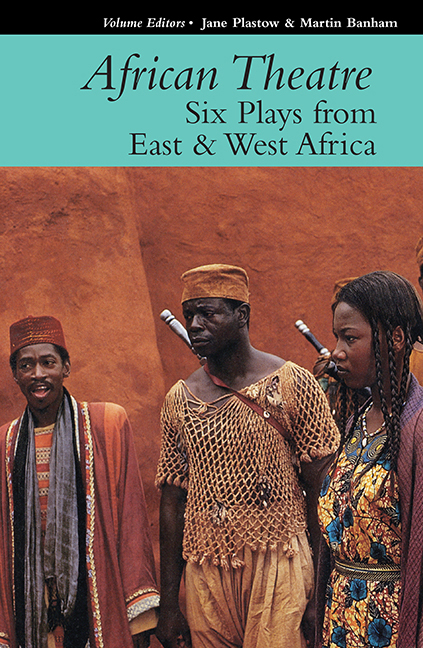Book contents
- Frontmatter
- Contents
- Notes on Contributors
- Obituary: Adieu Alain Ricard
- Preface
- THREE PLAYS FROM EAST AFRICA
- The translation & transcription of transcription of Mother Uganda & Her Children
- Mother Uganda & Her Children
- The context & making of Rose Mbowa's Mother Uganda & Her Children
- Majangwa: A Promise of Rains
- Notions of indigeneity: Uganda's Robert Serumaga
- The Guest (Engida): A One Act Play
- An Absurdist in Addis Ababa: Manyazewal Endeshaw's Engida
- THREE PLAYS FROM WEST AFRICA
- Book Reviews
An Absurdist in Addis Ababa: Manyazewal Endeshaw's Engida
from THREE PLAYS FROM EAST AFRICA
Published online by Cambridge University Press: 24 August 2019
- Frontmatter
- Contents
- Notes on Contributors
- Obituary: Adieu Alain Ricard
- Preface
- THREE PLAYS FROM EAST AFRICA
- The translation & transcription of transcription of Mother Uganda & Her Children
- Mother Uganda & Her Children
- The context & making of Rose Mbowa's Mother Uganda & Her Children
- Majangwa: A Promise of Rains
- Notions of indigeneity: Uganda's Robert Serumaga
- The Guest (Engida): A One Act Play
- An Absurdist in Addis Ababa: Manyazewal Endeshaw's Engida
- THREE PLAYS FROM WEST AFRICA
- Book Reviews
Summary
At the time of writing Engida is the most popular play in production among some fourteen shows on offer each week in the state theatres of Addis Ababa. It is also one of two plays written and directed by Manyazewal Endeshaw (from here on in, Manyazewal in keeping with Ethiopian usage where the first name is the given name and the second is the father's first name) currently being performed in the Ethiopian capital, which is, with the possible exceptions of Cape Town or Johannesburg, the most consistently prolific location for the production of professional live theatre on the African continent. As with all plays put on in these theatres it was written and performed in Amharic, the language of the Amhara people who make up just over a quarter of the Ethiopian population, who ruled the Ethiopian Empire for hundreds of years before it was overthrown in 1974, and whose tongue has become the language of commerce, state and culture.
Manyazewal was born into urban poverty in 1960 in Addis Ababa. His father was uneducated and his mother disabled, and Manyazewal rose through the hugely over-crowded public school system to gain a place at Addis Ababa University as one of the first students of Theatre Studies in 1977. He also grew up during a hugely politically traumatic time period.
In 1974 the ancient Ethiopian Empire and its ancient monarch, Haile Selassie, were overthrown by a military junta, the Derg that, in the process of establishing its dictatorial authority, imposed a reign of terror over the people, particularly in the capital. Like many of his contemporaries the young Manyazewal was involved in opposition socialist politics. As he recalled: ‘Most of us were members of different opposition political parties. There were many types of brutality. You could lose your life or be imprisoned because of a small incident, and you could be forgotten in a prison. It was a dark atmosphere, and the hope of survival was meagre.’ Manyazewal himself sees his attraction to absurdism as originating in the world of what came to be known as The Red Terror:
After passing through such experiences, I never thought that people would start to live properly and plan the future.
- Type
- Chapter
- Information
- African Theatre 16: Six Plays from East & West Africa , pp. 129 - 138Publisher: Boydell & BrewerPrint publication year: 2017

